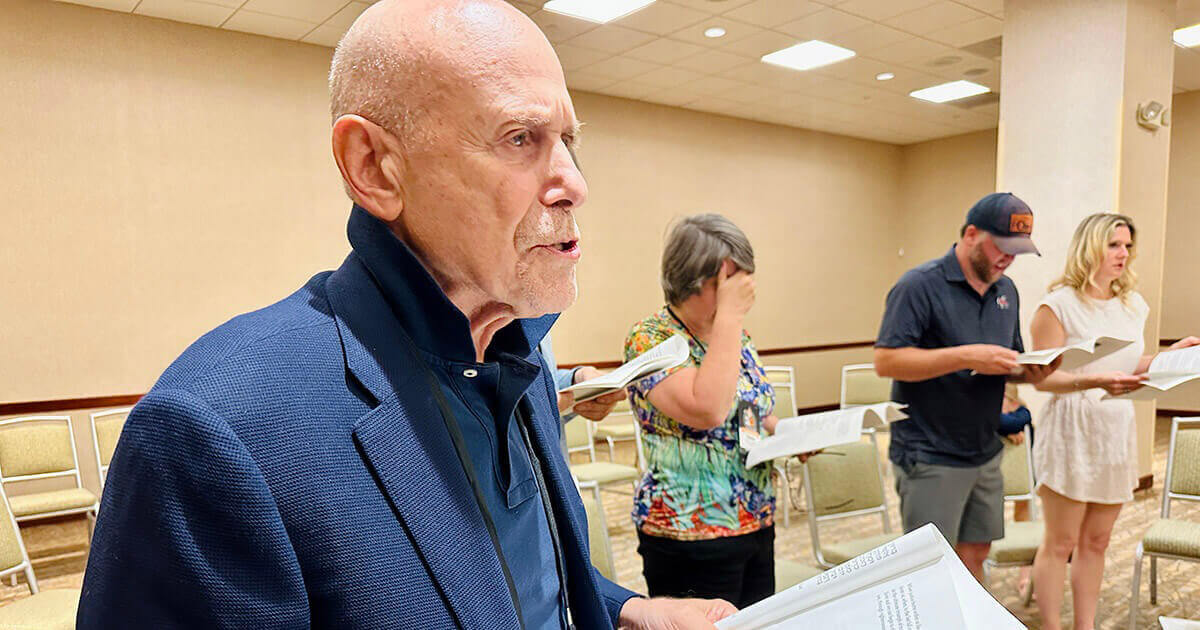Culture: Sacha Baron Cohen, Aaron Bisman, Carolyn Hessel, Scarlett Johansson, Jeremy Piven, Philip Roth, Gary Shteyngart, Barbra Streisand, Elie Wiesel
Sacha Baron Cohen
In the movie that’s sweeping America this week, “Borat: Cultural Learnings of America for Make Benefit Glorious Nation of Kazakhstan,” the oafish Kazakh reporter created by British comic Sacha Baron Cohen travels to Los Angeles to meet his dream girl, Canadian beauty Pamela Anderson, but he’s rejected and returns home. In reality, Baron Cohen bought a home in Los Angeles where he’s settling down with his fiancee, Australian beauty Isla Fisher, who is preparing to convert to Judaism. The first step — buying a home here — qualifies Baron Cohen for inclusion in the Forward 50, which is for members of the American Jewish community. The second, conversion, tells you a lot about why he intrigues us. His shtick, first aired on HBO’s “Da Ali G Show,” leaves half of us gasping and the other half outraged. It’s riddled with the basest antisemitism, racism, misogyny and anti-Kazakh stereotypes. We know he means it as a joke, a way of holding up a mirror to our flaws. But he’s only half kidding. His crusade against bigotry is a lifelong passion. Raised in an Orthodox home in Surrey and still observant, he was active in the Labor Zionist youth group Habonim (his online biography claims he was the all-Britain Habonim ga-ga champion) and spent a year on kibbutz. He wrote his Cambridge undergraduate thesis on Jewish involvement in the American civil rights movement. Friends say he’s a mix of class clown and earnest do-gooder. With his newest smash hit, he’s ratcheted things up a level, opening a national dialogue on prejudice. And early reports suggest that he’s now considered the funniest Jew in America. Jon Stewart, watch your back.
Aaron Bisman
Imagine you’re the 26-year-old CEO of a small, unlikely enterprise — a not-for-profit Jewish record label achieving genuine success — and the biggest star in your lineup fires you for being too small to handle the fame you helped him achieve. What do you do? If you’re Aaron Bisman, co-founder of JDub Records, you expand your horizons. Since his former friend and client, reggae sensation Matisyahu, left for new management, Bisman has kept busy with a growing number of progressive Jewish musicians, including Balkan Beat Box, an electronica-folk band; the six-piece klezmer-punk band Golem; Yiddish rapper DJ Socalled, and the rock band The Levees. He’s also launched a new artists’ grant program called the Six Points Fellowship. The Scottsdale, Ariz., native has made a name for himself by wrangling support for his relatively radical ideas from some of the stodgiest corners of the established Jewish community. But the truest keys to his success may be the simplest: his broad, yet oddly particular definition of Jewish music, and his belief in its power to forge community among young Jews.
Carolyn Hessel
Earlier this year, when the backers of the highbrow Koret Jewish Book Awards announced that they were shifting their emphasis from scholarly excellence to popular accessibility, some observers wondered about the repercussions for the Jewish book world. It had been widely accepted that while Koret handled the more erudite titles, the Jewish Book Awards, run by the Jewish Book Council, generally handled the more popular offerings. The jury is still out on the new Koret Awards, now under the auspices of Jewish Family & Life!, but the move seems to have left the Jewish Book Awards unscathed. The result is likely due to the grit and staying power of Carolyn Hessel, executive director of the Jewish Book Council, who remains one of the most powerful arbiters of Jewish literature in the United States. The council coordinates some 70 annual Jewish book fairs at community centers nationwide and oversees the National Jewish Book Awards. Insiders sometimes gripe that the process can unfairly make or break a book. But Hessel remains committed to her mission, even if her influence occasionally lands her in controversy. “My goal is to promote the reading, writing and understanding of books of Jewish interest,” she told the Forward. “And I define ‘Jewish interest’ in the broadest terms.”
Scarlett Johansson
Incredible, but the evidence is compelling: After two films together, a magazine cover and numerous joint interviews, Scarlett Johansson seems to have cured filmmaker Woody Allen of his shiksa fetish. Following in the WASP-y footsteps of Diane Keaton and Mia Farrow, the actress, who turns 22 this month, played the lead in Allen’s last two films — 2005’s “Match Point” and this year’s “Scoop” — and fit so seamlessly into his oeuvre that the auteur himself is said to have proclaimed her “touched by God.” The daughter of a Danish father and a Jewish mother with Bronx roots, Johansson is hardly just another pretty face (although she was named “the most beautiful woman in the world” this year by Esquire magazine and as “the world’s sexiest woman” by rival FHM). With four Golden Globe awards, she’s one of the most sought-after actresses working today. Nor is she another super-skinny Hollywood body; she famously flaunts her voluptuous curves (which have won her a few other “best in the world” honors best left unspecified). But all this pales in comparison with what’s on the horizon. According to press accounts, Johansson has been chosen to play Marjorie Morningstar, the iconic Jewess of modern American literature, in an Al Pacino-directed remake of Herman Wouk’s 1955 classic novel. Queen Esther and Bess Myerson, move over; a new Jewish beauty has conquered the world.
Jeremy Piven
The obnoxious Jew is cool again, and we have Jeremy Piven to thank. The 41-year-old actor is responsible for one of contemporary television’s most loathsome, exciting characters: Hollywood agent Ari Gold on HBO’s hit show, “Entourage.” Readers needn’t take our word for it; Piven walked away this summer with an Emmy for his work. Based on real-life superagent Ari Emanuel (who, coincidentally, also appears in this year’s Forward 50), Piven has so expertly captured the crass, brash persona of the Tinseltown Jew that he is said to have caused twinges of self-consciousness in many a real-life agent. And with the release of “Keeping Up With the Steins,” a wry feature-film take on the contemporary bar mitzvah, Piven, a native of Evanston, Ill., has proved that he can play more than one kind of Jewish character. For those who still didn’t get his philosophy of muscular, macho Jewishness, Piven posed for a GAP ad campaign — with his Star of David pendant hanging proudly from a chain between his clenched teeth.
Philip Roth
When a young writer closed her 2006 debut short-story collection with “Letter to Philip Roth,” she seemed to be voicing the anxiety of influence felt by her whole generation. Simply put, the 73-year-old icon continues to cast the widest shadow on American Jewish fiction. The evidence is so familiar that listing it seems superfluous: winner of the National Book Award, the National Medal of Arts and the Pulitzer Prize; author of several armies of books, an astonishing number of which could, on their own, each be considered the transcending work of a lifetime. Even as the Library of America packages his work for the canon of American fiction, Roth continues to churn out more of it. Some readers worried that this year’s offering — “Everyman,” his most straightforward meditation on death — hinted that the author has turned his attention to a world of which he is no longer a part. Perhaps. But if so, he may be one of the very few who can bear to envision it.
Gary Shteyngart
With the publication this year of his second novel, “Absurdistan,” writer Gary Shteyngart has dispelled fears that he might?e a one-hit wonder, and sealed his place as the leading writer of the new Russian Jewish immigrant generation.?hteyngart, 34, first hit the literary scene in 2003 with “The Russian Debutante’s Handbook,” a?austic, uproarious account of a young Russian immigrant searching for love, a job and a credible identity. The book?as a critical and commercial success, catapulting Shteyngart — a former staffer at the New?ork Association for New Americans (“Jew Americans, we used to call it,” he says) — to fame. He’s been working to unpeel the often-uncomfortable layers of the immigrant experience, skewering his fellow?ussians and indicting the American Jewish community into which they were thrust. (In Hebrew school, Shteyngart once told the Forward, “I felt so unaccepted, so hated by these Jews, because I was Russian, because I?idn’t wear the right shirt, because I was poor, because I read books.”) “Absurdistan”?emented Shteyngart’s role as one of today’s most forceful Jewish writers — one who takes his Jewishness seriously enough to question it utterly. “Compared with most young novelists his age, who tend toward cutesy involution, Shteyngart is a giant mounted on horseback,” wrote Walter Kirn in The New York Times.
Barbra Streisand
The rabbis of the Talmud taught that the Jews were preserved because they didn’t change their names, their way of speech or their religion. Barbra Streisand did them one better. She built a career by daring the public to mock her. She took on such risky roles as Fanny Brice in “Funny Girl,” Yentl the yeshiva boy and Katie Morosky, the Jewish socialist in “The Way We Were.” All these characters are thinly veiled versions of Streisand — gutsy, rebellious, indomitable — and she triumphed every time. At 64 she is the best-selling female singer in history and one of America’s most versatile and honored entertainers, with 10 Grammys, six Emmys, two Oscars, 11 Golden Globes, a Peabody and a Tony to her credit. She’s also one of the most controversial figures in Hollywood, a prodigious donor to Democratic and Jewish causes (from Peace Now to an Orthodox day school named after her father), and a relentless critic of the Bush White House. Her current live concert tour — only her second in 40 years — has drawn repeated heckling from fans who don’t like her anti-Bush gibes. Love her or hate her, she’s the living embodiment, on screen and off, of old-fashioned Jewish liberalism.
Elie Wiesel
This year, when Oprah Winfrey found that her reputation as the Queen of Media was in danger of being sullied, she reached for a surefire lifesaver: Elie Wiesel. Days after one of her book club selections was unmasked as a fraud, Winfrey named Wiesel’s 1958 classic “Night” as her next selection — ensuring it new life on the best-seller list and in book clubs nationwide. Wiesel, born in 1928 in Romania and deported to Auschwitz in 1944, initially earned fame for the harrowing existentialism of his memoirs. Although questions have been raised about the accuracy of certain passages in “Night,” none held enough water to undercut Wiesel’s latest primetime venture — which culminated with him leading Winfrey on a personal journey through Auschwitz. But winning stardom in Oprah’s book club is not the only accomplishment that sets this year apart as an important one for Wiesel. Following years of discussions, the United Nations held its first international day of remembrance of the Holocaust — an event made doubly significant by the escalating efforts of Iranian President Mahmoud Ahmadinejad to deny the Nazi genocide. (Wiesel recently called for Iran’s removal from the United Nations). Although some observers chafe at the 78-year-old’s status as a professional symbol of Jewish victimhood, this year there was no denying his power as a worldwide voice of conscience.
A message from our editor-in-chief Jodi Rudoren

We're building on 127 years of independent journalism to help you develop deeper connections to what it means to be Jewish today.
With so much at stake for the Jewish people right now — war, rising antisemitism, a high-stakes U.S. presidential election — American Jews depend on the Forward's perspective, integrity and courage.
— Jodi Rudoren, Editor-in-Chief






















